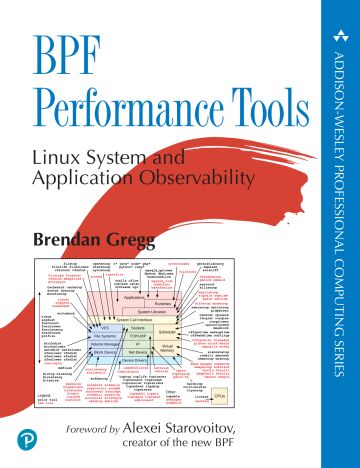User-level dynamic tracing support was just added to bcc[1], a front-end to Linux eBPF[2]. As a spooky example, let's trace interactive commands entered on all running bash shells, system-wide:
# ./bashreadline TIME PID COMMAND 05:28:25 21176 ls -l 05:28:28 21176 date 05:28:35 21176 echo hello world 05:28:43 21176 foo this command failed 05:28:45 21176 df -h 05:29:04 3059 echo another shell 05:29:13 21176 echo first shell again
This even sees commands that failed. bash doesn't need to be run in any special debug mode for this to work: all running bash shells are instrumented immediately, and new ones. You can walk up to a system that's never run eBPF before, and say: "so what's bash doing?" and then see. It's like a superpower.
Here's the entire bashreadline bcc/eBPF program:
This is tracing the return of the readline() function from /bin/bash, using a uretprobe (user-level return probe). The uretprobe runs a custom eBPF program, printret(), which prints the returned string. Because eBPF programs only operate on their own stack memory (improving safety), we need to use bpf_probe_read() to pull in the string for later operations (bpf_trace_printk()). This may go away: there's a lot of work in bcc to automatically do the bpf_probe_read()s for you, so you can write tools more easily.
This currently accesses the return value from the x86_64 %ax register[3], however, bcc should really provide an alias for this (eg, "rval"; it's bug #225[4]).
gethostlatency
As another example, gethostlatency traces name lookups (DNS) system-wide:
# ./gethostlatency TIME PID COMM LATms HOST 06:10:24 28011 wget 90.00 www.iovisor.org 06:10:28 28127 wget 0.00 www.iovisor.org 06:10:41 28404 wget 9.00 www.netflix.com 06:10:48 28544 curl 35.00 www.netflix.com.au 06:11:10 29054 curl 31.00 www.plumgrid.com 06:11:16 29195 curl 3.00 www.facebook.com 06:11:25 29404 curl 72.00 foo 06:11:28 29475 curl 1.00 foo
This time it's tracing three libc library functions, system wide: getaddrinfo(), gethostbyname(), and gethostbyname2(). The relevant code from the program is:
b.attach_uprobe(name="c", sym="getaddrinfo", fn_name="do_entry") b.attach_uprobe(name="c", sym="gethostbyname", fn_name="do_entry") b.attach_uprobe(name="c", sym="gethostbyname2", fn_name="do_entry") b.attach_uretprobe(name="c", sym="getaddrinfo", fn_name="do_return") b.attach_uretprobe(name="c", sym="gethostbyname", fn_name="do_return") b.attach_uretprobe(name="c", sym="gethostbyname2", fn_name="do_return")
This attaches custom eBPF functions to the library function calls and function returns, via uprobes and uretprobes. The name="c" is referring to libc. Tracing both calls and returns was necessary to save and retrieve timestamps for calculating the latency. Check out the full program: gethostlatency.
Summary
User-level dynamic tracing is a new bcc/eBPF feature. I demonstrated it by tracing user-level functions and system library functions, and with two new tools: bashreadline and gethostlatency.
We have some work to improve uprobe usage, but that you can now use them at all is a big milestone.
References & Links
- https://github.com/iovisor/bcc
- http://www.brendangregg.com/blog/2015-05-15/ebpf-one-small-step.html
- https://en.wikipedia.org/wiki/X86_calling_conventions#System_V_AMD64_ABI
- https://github.com/iovisor/bcc/issues/225
Thanks Brenden Blanco (PLUMgrid) for uprobe support!


Click here for Disqus comments (ad supported).